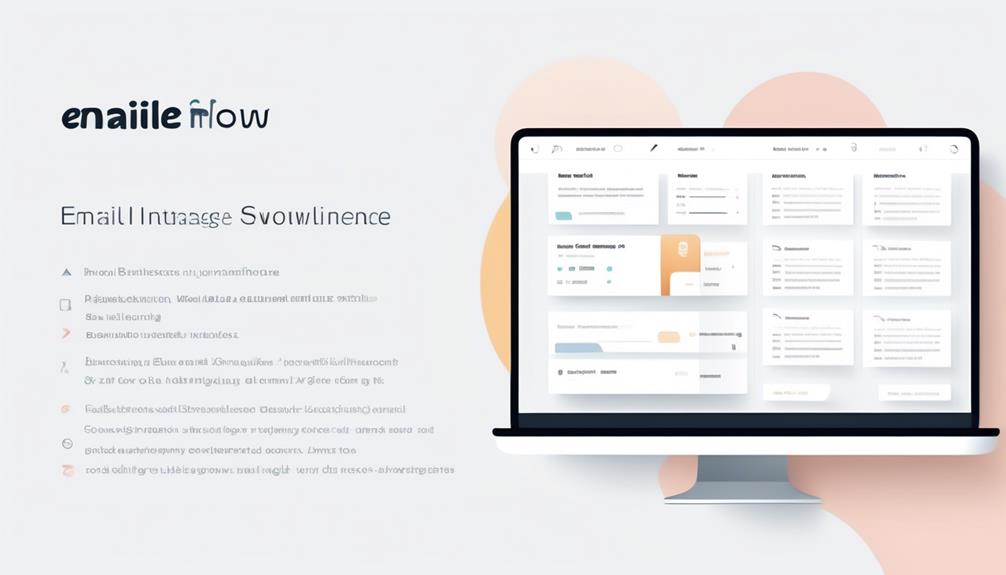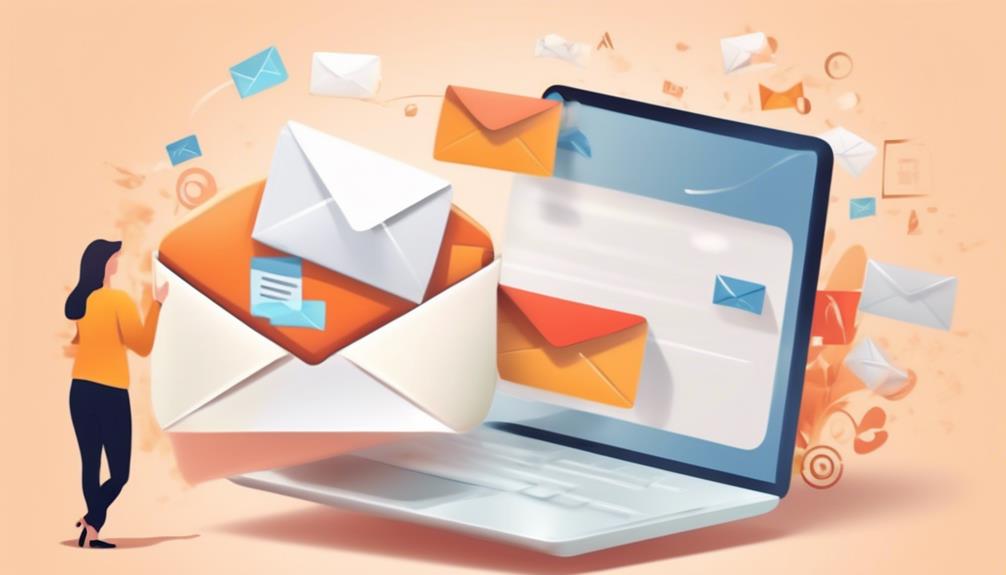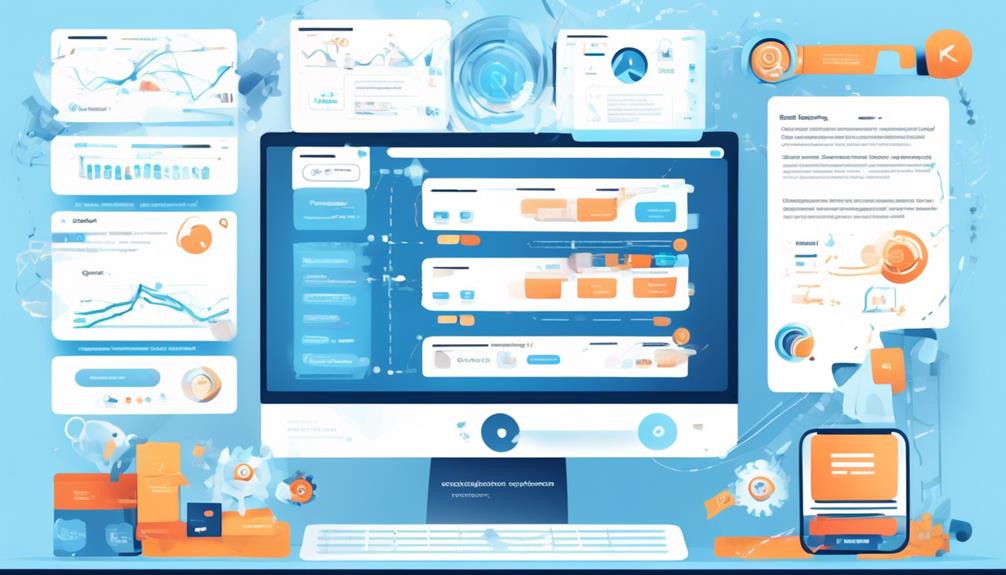We’ve all dealt with the annoyance of getting a standard email when it’s least convenient, but picture the effect of getting a customized, well-timed email from a business exactly at the moment you require it.
With Salesforce's email automation capabilities, this level of tailored communication is not only possible but also efficient. The ability to schedule automated emails or trigger them based on customer actions can revolutionize the way businesses engage with their audience.
But there's more to it than just convenience – Salesforce's email automation feature offers a range of benefits that can significantly enhance a company's marketing efforts and customer relationships.
Key Takeaways
- Salesforce Email Automation offers numerous benefits, including higher click rates, improved customer satisfaction, tailored content, and cost-effectiveness.
- Setting up Email Automation in Salesforce involves using Flows, combining with Mailtrap SMTP, following official documentation, setting up triggers, and personalizing automated emails.
- Salesforce provides various Email Automation options, such as Journey Builder, Email Studio, Einstein Engagement Scoring, Pardot, and Salesforce Engage.
- Best practices for Email Automation include delivering personalized content, utilizing CRM data, capturing new customer data, implementing segmentation and targeting strategies, and continuously analyzing and optimizing performance.
Benefits of Salesforce Email Automation
How can Salesforce email automation benefit businesses and improve customer engagement?
Salesforce's email marketing automation allows businesses to send targeted, personalized, and timely automated emails, resulting in a 199% higher click rate compared to traditional broadcast emails. This increased engagement can lead to improved customer satisfaction and loyalty.
By utilizing CRM data, automated email campaigns can be tailored to individual preferences, behaviors, and interactions, providing relevant content that resonates with recipients. This level of personalization enhances customer engagement and can lead to higher conversion rates.
Additionally, Salesforce's Marketing Cloud integrates with sales and service, providing a comprehensive view of the customer. This integration saves time, resources, and money for businesses by streamlining processes and enabling sales teams to access valuable customer data for more effective communication.
Furthermore, the cost-effectiveness of event-triggered email marketing can reduce marketing spend by up to 80%, making it a lucrative solution for businesses looking to optimize their marketing efforts.
Setting up Email Automation in Salesforce

To set up email automation in Salesforce, businesses can utilize Flows, a feature-rich automation tool supported by Salesforce. Flows allow for the creation of automated processes that can send automated emails based on specific triggers and customer actions.
When setting up email automation in Salesforce, it's important to combine Flows with Mailtrap SMTP for high deliverability and infrastructure control. Following Salesforce's official documentation for transitioning to Flows is crucial to ensure a smooth and effective setup process.
Additionally, businesses should set up triggers based on specific events or customer actions to ensure that the automated emails are sent at the right time, targeting the right audience. Moreover, personalizing automated emails using customer data points is essential for effective marketing and sales efforts.
Email Automation Options in Salesforce
In Salesforce, businesses have various powerful email automation options available to streamline marketing and sales efforts and enhance customer engagement.
The platform offers a range of tools for automating email communication, including Journey Builder, Email Studio, Einstein Engagement Scoring, Pardot, and Salesforce Engage.
Journey Builder allows businesses to design personalized customer journeys and trigger automated emails at crucial touchpoints, while Email Studio provides a user-friendly interface for creating, sending, and tracking professional emails.
Einstein Engagement Scoring leverages AI to analyze audience interactions and optimize email timing, content, and subject lines. Pardot offers a comprehensive marketing automation solution for B2B companies, including email nurturing campaigns.
Additionally, Salesforce Engage empowers sales representatives with personalized, automated emails and enables them to track prospect interactions.
These email automation options within Salesforce's CRM and Marketing Cloud ecosystem enable businesses to leverage automation tools, merge fields, and personalized emails to effectively engage with email recipients and drive meaningful interactions.
Best Practices for Email Automation

When implementing best practices for email automation, businesses must prioritize personalized experiences and analyze customer data to drive effective engagement and conversions.
Utilizing automated emails to deliver personalized content tailored to individual customer preferences is essential. This involves leveraging data from CRM systems to understand customer behaviors and preferences.
Additionally, businesses should focus on creating new and innovative ways to capture customer data, ensuring that the automated emails are always relevant and timely.
Implementing segmentation and targeting strategies based on customer interactions and behaviors is crucial for effective email automation.
Furthermore, businesses should continuously analyze the performance of their automated email campaigns to refine and optimize their strategies for better results.
- Deliver personalized content through automated emails
- Utilize CRM data to understand customer behaviors and preferences
- Capture new customer data for relevance and timeliness
- Implement segmentation and targeting strategies
- Continuously analyze and optimize email automation performance
How Does RPA Email Automation Compare to Salesforce Email Automation?
When comparing RPA email automation to Salesforce email automation, it’s essential to consider the specific needs of your organization. While both solutions offer powerful features, RPA email automation guide can provide a more tailored and flexible approach to email automation, depending on your unique business requirements.
Integrating Email Automation With CRM
Integrating email automation with CRM systems enhances personalized customer experiences by leveraging valuable customer data. This integration allows us to send automated emails tailored to specific email recipients and content, maximizing the email automation capabilities of the CRM.
By leveraging Salesforce's Marketing Cloud features, we can efficiently integrate email automation with CRM, enabling personalized customer interactions at scale. This integration provides various automation options, allowing for tailored messaging and lead nurturing throughout the buyer's journey.
Furthermore, integrating email automation with CRM provides detailed behavioral profiles on prospects, enabling more effective messaging and lead nurturing. This approach enhances customer relationships and allows for targeted messaging based on prospect interests and their position in the buying cycle, ultimately leading to improved customer satisfaction and increased sales.
Therefore, leveraging the power of CRM and email automation together is essential for businesses aiming to provide a personalized customer experience and drive better results through their marketing initiatives.
Frequently Asked Questions
Does Salesforce Have Email Automation?
Yes, Salesforce does have email automation.
It includes features like:
- Journey Builder: This tool enables the design, sending, and tracking of professional emails with AI optimization and comprehensive marketing automation solutions.
- Email Studio: This tool provides user-friendly tools for content creation, personalization, and built-in analytics.
- Einstein Engagement Scoring: This feature uses AI to analyze customer interactions and predict their likelihood of engagement.
- Pardot: This tool is a comprehensive marketing automation solution that includes email automation, lead management, and ROI reporting.
- Salesforce Engage: This tool is designed for sales teams and provides personalized email templates, real-time notifications, and tracking capabilities.
These tools integrate with sales and service, providing a seamless experience and saving time, resources, and money for businesses.
Does Salesforce Have Email Campaigns?
Yes, Salesforce offers robust email campaign capabilities. This includes customizable templates, user-friendly tools, and built-in analytics for effective campaigns.
Our Marketing Cloud integrates with sales and service for a comprehensive customer view. This integration enhances relationships and loyalty.
With daily email limits based on the edition, Salesforce ensures efficient email management and compliance.
The platform also allows for personalized and customized email templates. Automation rules and workflows are available to streamline campaigns.
Can CRM Send Automated Emails?
Yes, CRM systems can send automated emails by utilizing customer data for personalized experiences. This approach increases engagement and click rates.
Automated email marketing is effective for e-commerce, newsletters, remarketing, and completed transactions. Customizable solutions can be tailored to specific business needs, offering a comprehensive customer view.
This strategy is proven to enhance customer relationships and drive sales.
Is It Possible to Automate Salesforce?
Yes, it's possible to automate Salesforce. We can streamline repetitive tasks, improve data accuracy, and boost productivity. With automation, we can focus on more strategic initiatives and enhance customer experiences.
Conclusion
In conclusion, Salesforce email automation offers numerous benefits for businesses.
One major advantage is that it saves time. By setting up automated emails, businesses can streamline their communication process and free up valuable resources.
Another benefit is improved targeting. With Salesforce email automation, businesses can segment their audience and send personalized messages based on customer preferences and behaviors. This level of targeting ensures that emails are more relevant and engaging, increasing the chances of conversion.
Furthermore, Salesforce email automation can significantly increase conversion rates. By delivering the right message to the right person at the right time, businesses can effectively nurture leads and guide them through the sales funnel.
For example, a company saw a 20% increase in sales after implementing Salesforce email automation. This real-life case study demonstrates the tangible impact it can have on driving business growth.
With the right setup and integration, email automation in Salesforce can truly revolutionize a company's marketing efforts. It offers a powerful tool to connect with customers, nurture leads, and ultimately drive revenue.









